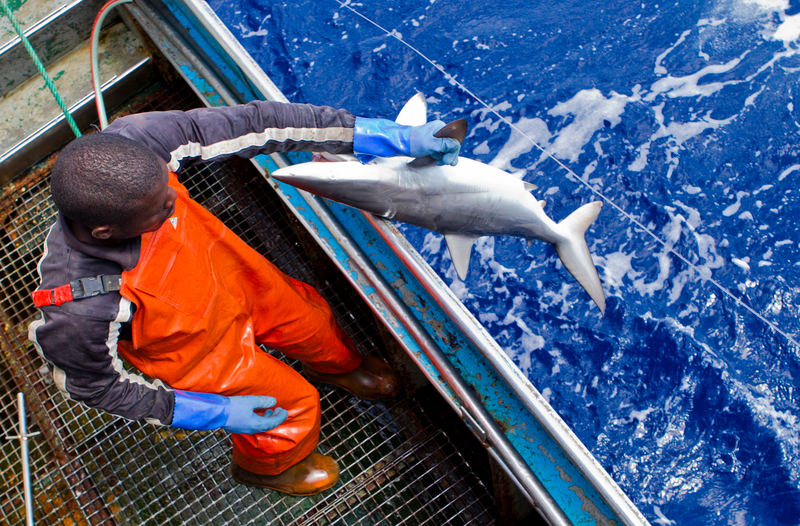ADF STAFF
Justine Tinou remembered when the beach at Pointe-Noire, a port town in the Republic of the Congo, would be lined with sardinella, tuna, sharks and rays waiting to be bought, processed and sold.
That was about 20 years ago when the country’s fishing industry was booming. Now, thanks to an influx of foreign industrial trawlers, the beach is mostly clear at the end of a fishing day.
The smaller fish species have been long overfished, and the number of sharks and rays have dramatically decreased, threatening the livelihoods of those in the fishing industry, depleting an important source of animal protein and harming the ecosystem.
Local fishermen told the BBC that their hauls now are mostly juvenile fish, a sign that current fishing practices are unsustainable.
“Artisanal fishing used to be profitable, but not anymore,” Tinou, who sells cured fish at a market in Pointe-Noire, told the BBC. “The prices have gone up because the fish are scarce. Shark, tuna — they are both rarer now. Even sardinella, which used to be so abundant, you don’t see it anymore.”
Local fisherman Alain Pangou said one artisanal boat could catch up to 100 sharks a day. Then, increasing numbers of industrial trawlers arrived.
“These days it’s more complicated,” Pangou said.
Shark and ray fishing began to intensify around the year 2000, driven by demand for fins in East and Southeast Asia, Jean-Michel Dziengue, program officer for the Association La Bouée Couronne, told TRAFFIC.
“There were Asian boat workers who began to take interest in the fin trade,” Dziengue said in a film produced by TRAFFIC, a wildlife trade monitoring network. “Shark became very sought after in Congo. There’s a whole industry around sharks. Small-scale fishing finds itself in a vise. On one hand there are oil platforms and on the other there is industrial fishing. That hinders the small-scale fisherman’s activities.”
Although most of the shark and ray meat is sold and consumed domestically, almost all fins are exported, many of them from endangered species identified by the Convention on International Trade in Endangered Species of Wild Fauna and Flora (CITES). A TRAFFIC study found no evidence of exports conforming to CITES regulations.
Although China reported total imports of 131,594 kilograms of dried shark fins from the Congo between 2005 and 2019, there are no records of fin exports in the national fisheries or customs data, the study showed. China is the world’s worst illegal, unreported, and unregulated (IUU) fishing offender, and its distant-water fishing fleet is dominant in West Africa.
The Congo’s waters are crowded despite the decreasing fish populations. There is an active fleet of more than 110 industrial vessels and nearly 700 artisanal boats along the Congo’s 169- kilometer coastline, far exceeding the national exclusive economic zone’s capacity of about 30 industrial vessels, the TRAFFIC report showed.
The country’s growing exclusion zone around oil rigs also has reduced the size of the designated artisanal fishing area by almost two-thirds, while an influx of people to the country’s coastal areas has led to more artisanal fishermen on the water, the BBC reported.
As in other parts of West Africa, the Congo does not have adequate maritime security resources. A study by the Society for Conservation Biology showed that as much as one-third of fishing in the Congo occur in prohibited areas, and industrial foreign trawlers account for as much as 84% of the illegal activity.
The continued overfishing of sharks and rays can have devastating long-term effects. Their loss can lead to dramatic imbalances in the ecosystem, which can degrade coral reefs and destroy seagrass beds that provide nursery habitats for juvenile fish, said Steve Trent, executive director of the Environmental Justice Foundation.
“Sharks and rays are particularly vulnerable to overfishing because they tend to grow slowly, reach sexual maturity late and have low rates of reproduction,” Trent told ADF in an email. “Worldwide, a quarter of all these species are classified as threatened as a direct result of overfishing.”
Last year, the Congo’s fishing ministry established a monitoring, control and surveillance center in an effort to reduce IUU fishing.
Through a partnership with CLS Group, a global fisheries monitoring company, authorities now have greater access to a vessel’s licensing information, and enhanced monitoring systems help them determine in real time whether vessels are fishing in prohibited areas.
“We must be very careful about the number of fishing boats,” Henri Djombo, Congo’s minister of agriculture, livestock and fisheries, said in a news release. “Only boats with a 2020 license are allowed to fish. The administration must ensure that this provision is respected and ask boats operating in Congolese marine waters to comply with the law.”

